Leadership, Organisation Development, and Strategies at Tesco Plc
VerifiedAdded on 2020/10/22
|12
|2533
|124
Report
AI Summary
This report provides an in-depth analysis of leadership, organizational development, and strategies at Tesco Plc. It begins with an introduction to leadership skills, organizational development, and their interrelation, followed by a company background of Tesco. A literature review explores various leadership styles, with a specific focus on the democratic style employed by Tesco's management. The report examines the vision and mission of the organization and provides an analysis of Tesco's strategies for growth and customer satisfaction. It analyzes the impact of leadership skills and organizational development on the company's success, and concludes with recommendations for improving leadership practices within Tesco, including the adoption of transformational and situational leadership styles, and a focus on employee needs. The report emphasizes the importance of aligning leadership with the company's vision and mission to achieve long-term growth and market competitiveness.
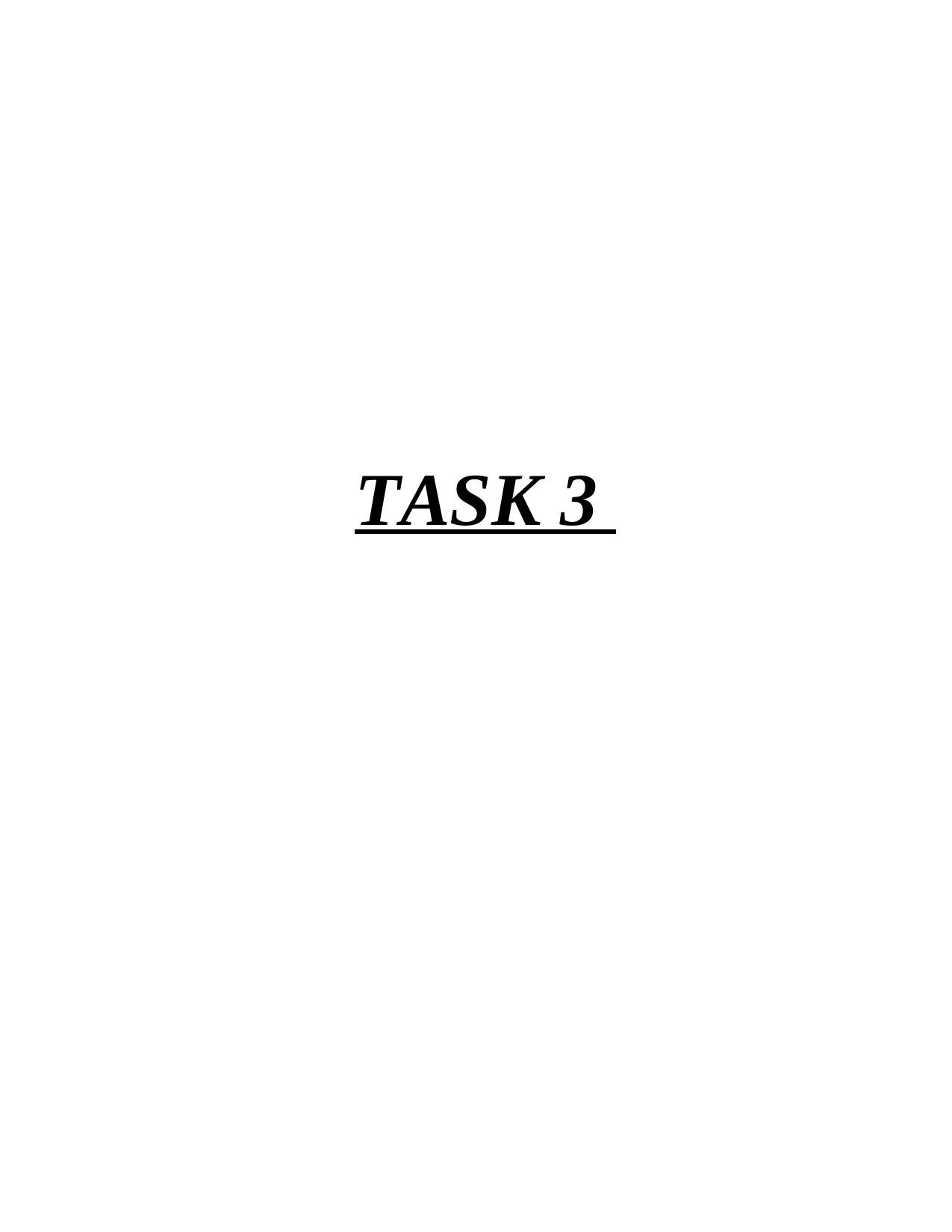
TASK 3
Paraphrase This Document
Need a fresh take? Get an instant paraphrase of this document with our AI Paraphraser
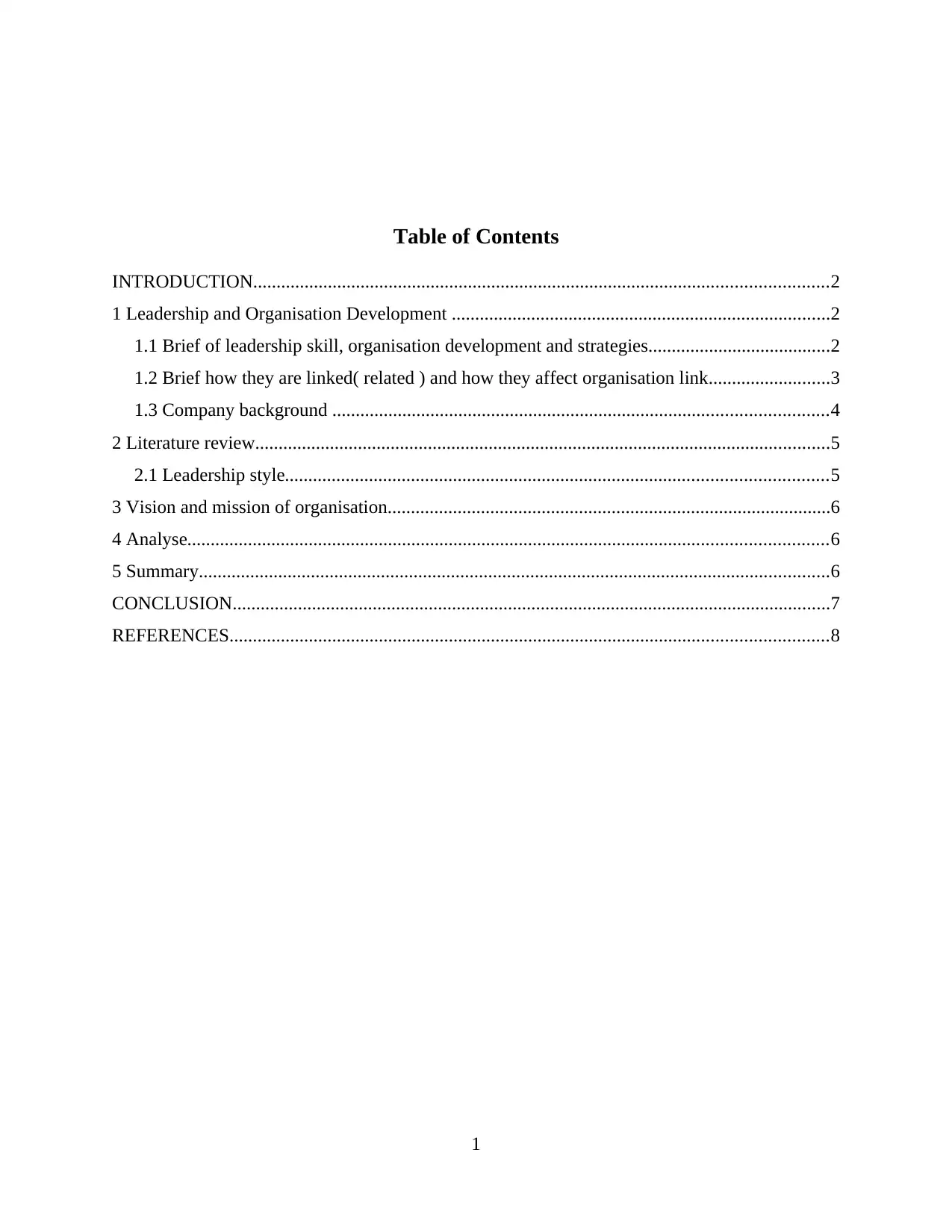
Table of Contents
INTRODUCTION...........................................................................................................................2
1 Leadership and Organisation Development .................................................................................2
1.1 Brief of leadership skill, organisation development and strategies.......................................2
1.2 Brief how they are linked( related ) and how they affect organisation link..........................3
1.3 Company background ..........................................................................................................4
2 Literature review...........................................................................................................................5
2.1 Leadership style....................................................................................................................5
3 Vision and mission of organisation...............................................................................................6
4 Analyse.........................................................................................................................................6
5 Summary.......................................................................................................................................6
CONCLUSION................................................................................................................................7
REFERENCES................................................................................................................................8
1
INTRODUCTION...........................................................................................................................2
1 Leadership and Organisation Development .................................................................................2
1.1 Brief of leadership skill, organisation development and strategies.......................................2
1.2 Brief how they are linked( related ) and how they affect organisation link..........................3
1.3 Company background ..........................................................................................................4
2 Literature review...........................................................................................................................5
2.1 Leadership style....................................................................................................................5
3 Vision and mission of organisation...............................................................................................6
4 Analyse.........................................................................................................................................6
5 Summary.......................................................................................................................................6
CONCLUSION................................................................................................................................7
REFERENCES................................................................................................................................8
1
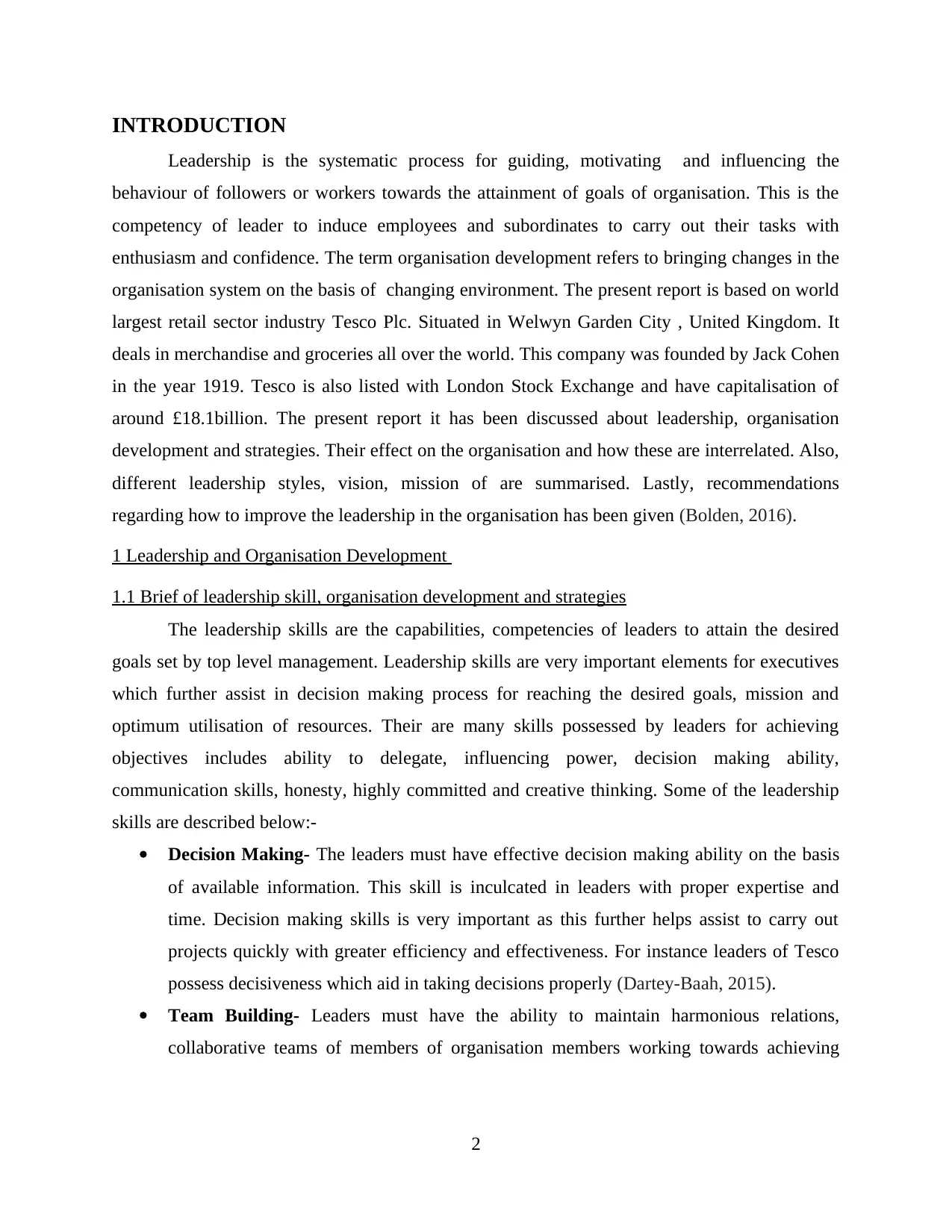
INTRODUCTION
Leadership is the systematic process for guiding, motivating and influencing the
behaviour of followers or workers towards the attainment of goals of organisation. This is the
competency of leader to induce employees and subordinates to carry out their tasks with
enthusiasm and confidence. The term organisation development refers to bringing changes in the
organisation system on the basis of changing environment. The present report is based on world
largest retail sector industry Tesco Plc. Situated in Welwyn Garden City , United Kingdom. It
deals in merchandise and groceries all over the world. This company was founded by Jack Cohen
in the year 1919. Tesco is also listed with London Stock Exchange and have capitalisation of
around £18.1billion. The present report it has been discussed about leadership, organisation
development and strategies. Their effect on the organisation and how these are interrelated. Also,
different leadership styles, vision, mission of are summarised. Lastly, recommendations
regarding how to improve the leadership in the organisation has been given (Bolden, 2016).
1 Leadership and Organisation Development
1.1 Brief of leadership skill, organisation development and strategies
The leadership skills are the capabilities, competencies of leaders to attain the desired
goals set by top level management. Leadership skills are very important elements for executives
which further assist in decision making process for reaching the desired goals, mission and
optimum utilisation of resources. Their are many skills possessed by leaders for achieving
objectives includes ability to delegate, influencing power, decision making ability,
communication skills, honesty, highly committed and creative thinking. Some of the leadership
skills are described below:-
Decision Making- The leaders must have effective decision making ability on the basis
of available information. This skill is inculcated in leaders with proper expertise and
time. Decision making skills is very important as this further helps assist to carry out
projects quickly with greater efficiency and effectiveness. For instance leaders of Tesco
possess decisiveness which aid in taking decisions properly (Dartey-Baah, 2015).
Team Building- Leaders must have the ability to maintain harmonious relations,
collaborative teams of members of organisation members working towards achieving
2
Leadership is the systematic process for guiding, motivating and influencing the
behaviour of followers or workers towards the attainment of goals of organisation. This is the
competency of leader to induce employees and subordinates to carry out their tasks with
enthusiasm and confidence. The term organisation development refers to bringing changes in the
organisation system on the basis of changing environment. The present report is based on world
largest retail sector industry Tesco Plc. Situated in Welwyn Garden City , United Kingdom. It
deals in merchandise and groceries all over the world. This company was founded by Jack Cohen
in the year 1919. Tesco is also listed with London Stock Exchange and have capitalisation of
around £18.1billion. The present report it has been discussed about leadership, organisation
development and strategies. Their effect on the organisation and how these are interrelated. Also,
different leadership styles, vision, mission of are summarised. Lastly, recommendations
regarding how to improve the leadership in the organisation has been given (Bolden, 2016).
1 Leadership and Organisation Development
1.1 Brief of leadership skill, organisation development and strategies
The leadership skills are the capabilities, competencies of leaders to attain the desired
goals set by top level management. Leadership skills are very important elements for executives
which further assist in decision making process for reaching the desired goals, mission and
optimum utilisation of resources. Their are many skills possessed by leaders for achieving
objectives includes ability to delegate, influencing power, decision making ability,
communication skills, honesty, highly committed and creative thinking. Some of the leadership
skills are described below:-
Decision Making- The leaders must have effective decision making ability on the basis
of available information. This skill is inculcated in leaders with proper expertise and
time. Decision making skills is very important as this further helps assist to carry out
projects quickly with greater efficiency and effectiveness. For instance leaders of Tesco
possess decisiveness which aid in taking decisions properly (Dartey-Baah, 2015).
Team Building- Leaders must have the ability to maintain harmonious relations,
collaborative teams of members of organisation members working towards achieving
2
⊘ This is a preview!⊘
Do you want full access?
Subscribe today to unlock all pages.

Trusted by 1+ million students worldwide
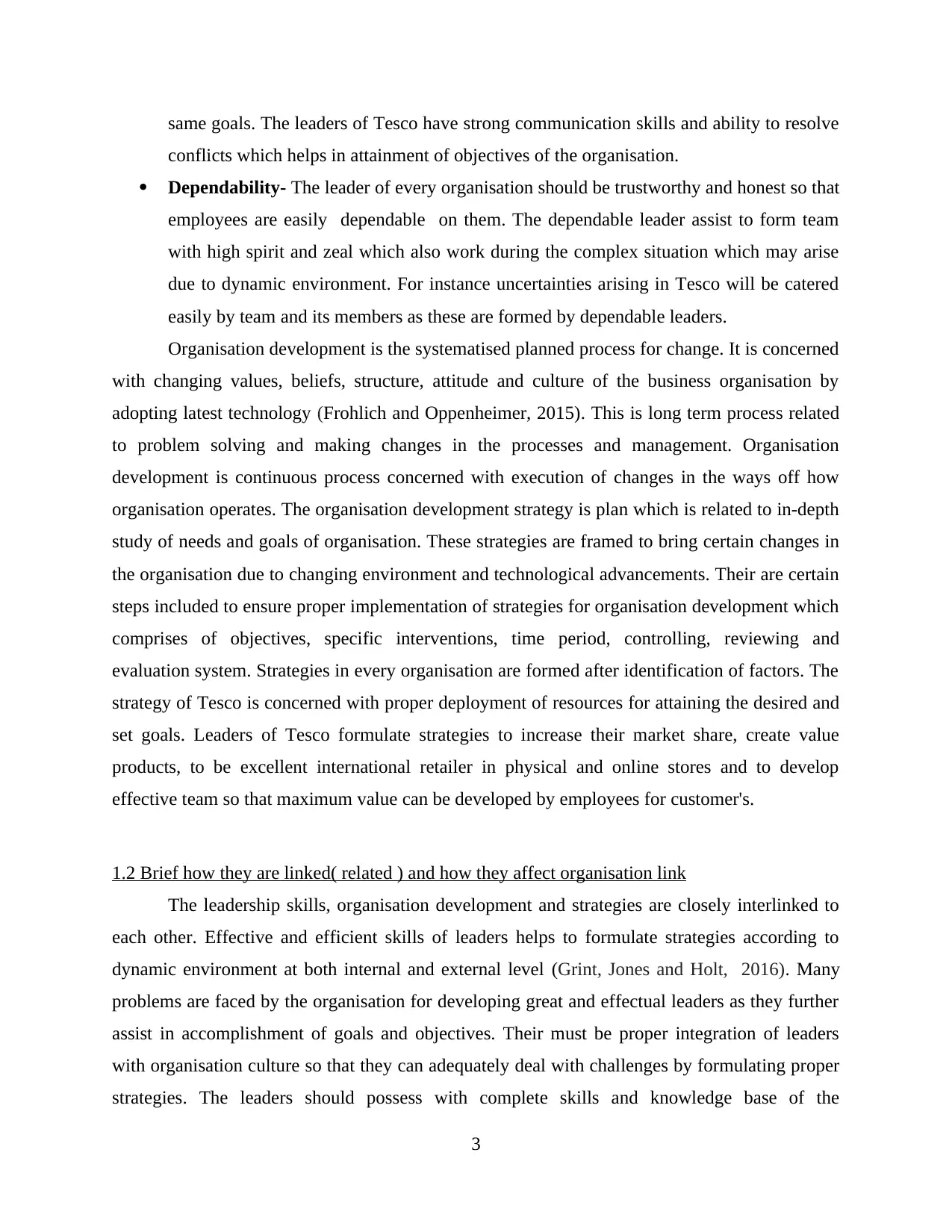
same goals. The leaders of Tesco have strong communication skills and ability to resolve
conflicts which helps in attainment of objectives of the organisation.
Dependability- The leader of every organisation should be trustworthy and honest so that
employees are easily dependable on them. The dependable leader assist to form team
with high spirit and zeal which also work during the complex situation which may arise
due to dynamic environment. For instance uncertainties arising in Tesco will be catered
easily by team and its members as these are formed by dependable leaders.
Organisation development is the systematised planned process for change. It is concerned
with changing values, beliefs, structure, attitude and culture of the business organisation by
adopting latest technology (Frohlich and Oppenheimer, 2015). This is long term process related
to problem solving and making changes in the processes and management. Organisation
development is continuous process concerned with execution of changes in the ways off how
organisation operates. The organisation development strategy is plan which is related to in-depth
study of needs and goals of organisation. These strategies are framed to bring certain changes in
the organisation due to changing environment and technological advancements. Their are certain
steps included to ensure proper implementation of strategies for organisation development which
comprises of objectives, specific interventions, time period, controlling, reviewing and
evaluation system. Strategies in every organisation are formed after identification of factors. The
strategy of Tesco is concerned with proper deployment of resources for attaining the desired and
set goals. Leaders of Tesco formulate strategies to increase their market share, create value
products, to be excellent international retailer in physical and online stores and to develop
effective team so that maximum value can be developed by employees for customer's.
1.2 Brief how they are linked( related ) and how they affect organisation link
The leadership skills, organisation development and strategies are closely interlinked to
each other. Effective and efficient skills of leaders helps to formulate strategies according to
dynamic environment at both internal and external level (Grint, Jones and Holt, 2016). Many
problems are faced by the organisation for developing great and effectual leaders as they further
assist in accomplishment of goals and objectives. Their must be proper integration of leaders
with organisation culture so that they can adequately deal with challenges by formulating proper
strategies. The leaders should possess with complete skills and knowledge base of the
3
conflicts which helps in attainment of objectives of the organisation.
Dependability- The leader of every organisation should be trustworthy and honest so that
employees are easily dependable on them. The dependable leader assist to form team
with high spirit and zeal which also work during the complex situation which may arise
due to dynamic environment. For instance uncertainties arising in Tesco will be catered
easily by team and its members as these are formed by dependable leaders.
Organisation development is the systematised planned process for change. It is concerned
with changing values, beliefs, structure, attitude and culture of the business organisation by
adopting latest technology (Frohlich and Oppenheimer, 2015). This is long term process related
to problem solving and making changes in the processes and management. Organisation
development is continuous process concerned with execution of changes in the ways off how
organisation operates. The organisation development strategy is plan which is related to in-depth
study of needs and goals of organisation. These strategies are framed to bring certain changes in
the organisation due to changing environment and technological advancements. Their are certain
steps included to ensure proper implementation of strategies for organisation development which
comprises of objectives, specific interventions, time period, controlling, reviewing and
evaluation system. Strategies in every organisation are formed after identification of factors. The
strategy of Tesco is concerned with proper deployment of resources for attaining the desired and
set goals. Leaders of Tesco formulate strategies to increase their market share, create value
products, to be excellent international retailer in physical and online stores and to develop
effective team so that maximum value can be developed by employees for customer's.
1.2 Brief how they are linked( related ) and how they affect organisation link
The leadership skills, organisation development and strategies are closely interlinked to
each other. Effective and efficient skills of leaders helps to formulate strategies according to
dynamic environment at both internal and external level (Grint, Jones and Holt, 2016). Many
problems are faced by the organisation for developing great and effectual leaders as they further
assist in accomplishment of goals and objectives. Their must be proper integration of leaders
with organisation culture so that they can adequately deal with challenges by formulating proper
strategies. The leaders should possess with complete skills and knowledge base of the
3
Paraphrase This Document
Need a fresh take? Get an instant paraphrase of this document with our AI Paraphraser
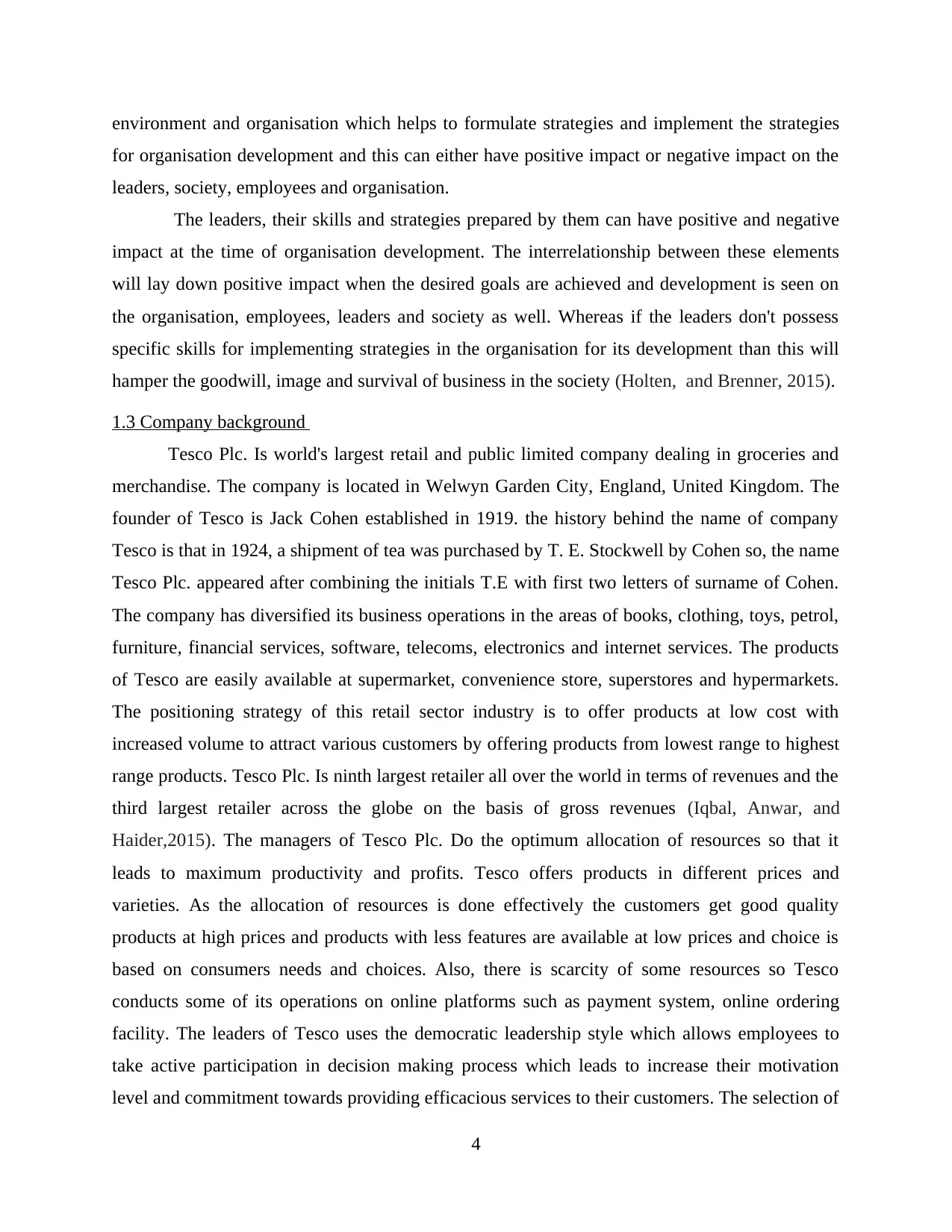
environment and organisation which helps to formulate strategies and implement the strategies
for organisation development and this can either have positive impact or negative impact on the
leaders, society, employees and organisation.
The leaders, their skills and strategies prepared by them can have positive and negative
impact at the time of organisation development. The interrelationship between these elements
will lay down positive impact when the desired goals are achieved and development is seen on
the organisation, employees, leaders and society as well. Whereas if the leaders don't possess
specific skills for implementing strategies in the organisation for its development than this will
hamper the goodwill, image and survival of business in the society (Holten, and Brenner, 2015).
1.3 Company background
Tesco Plc. Is world's largest retail and public limited company dealing in groceries and
merchandise. The company is located in Welwyn Garden City, England, United Kingdom. The
founder of Tesco is Jack Cohen established in 1919. the history behind the name of company
Tesco is that in 1924, a shipment of tea was purchased by T. E. Stockwell by Cohen so, the name
Tesco Plc. appeared after combining the initials T.E with first two letters of surname of Cohen.
The company has diversified its business operations in the areas of books, clothing, toys, petrol,
furniture, financial services, software, telecoms, electronics and internet services. The products
of Tesco are easily available at supermarket, convenience store, superstores and hypermarkets.
The positioning strategy of this retail sector industry is to offer products at low cost with
increased volume to attract various customers by offering products from lowest range to highest
range products. Tesco Plc. Is ninth largest retailer all over the world in terms of revenues and the
third largest retailer across the globe on the basis of gross revenues (Iqbal, Anwar, and
Haider,2015). The managers of Tesco Plc. Do the optimum allocation of resources so that it
leads to maximum productivity and profits. Tesco offers products in different prices and
varieties. As the allocation of resources is done effectively the customers get good quality
products at high prices and products with less features are available at low prices and choice is
based on consumers needs and choices. Also, there is scarcity of some resources so Tesco
conducts some of its operations on online platforms such as payment system, online ordering
facility. The leaders of Tesco uses the democratic leadership style which allows employees to
take active participation in decision making process which leads to increase their motivation
level and commitment towards providing efficacious services to their customers. The selection of
4
for organisation development and this can either have positive impact or negative impact on the
leaders, society, employees and organisation.
The leaders, their skills and strategies prepared by them can have positive and negative
impact at the time of organisation development. The interrelationship between these elements
will lay down positive impact when the desired goals are achieved and development is seen on
the organisation, employees, leaders and society as well. Whereas if the leaders don't possess
specific skills for implementing strategies in the organisation for its development than this will
hamper the goodwill, image and survival of business in the society (Holten, and Brenner, 2015).
1.3 Company background
Tesco Plc. Is world's largest retail and public limited company dealing in groceries and
merchandise. The company is located in Welwyn Garden City, England, United Kingdom. The
founder of Tesco is Jack Cohen established in 1919. the history behind the name of company
Tesco is that in 1924, a shipment of tea was purchased by T. E. Stockwell by Cohen so, the name
Tesco Plc. appeared after combining the initials T.E with first two letters of surname of Cohen.
The company has diversified its business operations in the areas of books, clothing, toys, petrol,
furniture, financial services, software, telecoms, electronics and internet services. The products
of Tesco are easily available at supermarket, convenience store, superstores and hypermarkets.
The positioning strategy of this retail sector industry is to offer products at low cost with
increased volume to attract various customers by offering products from lowest range to highest
range products. Tesco Plc. Is ninth largest retailer all over the world in terms of revenues and the
third largest retailer across the globe on the basis of gross revenues (Iqbal, Anwar, and
Haider,2015). The managers of Tesco Plc. Do the optimum allocation of resources so that it
leads to maximum productivity and profits. Tesco offers products in different prices and
varieties. As the allocation of resources is done effectively the customers get good quality
products at high prices and products with less features are available at low prices and choice is
based on consumers needs and choices. Also, there is scarcity of some resources so Tesco
conducts some of its operations on online platforms such as payment system, online ordering
facility. The leaders of Tesco uses the democratic leadership style which allows employees to
take active participation in decision making process which leads to increase their motivation
level and commitment towards providing efficacious services to their customers. The selection of
4
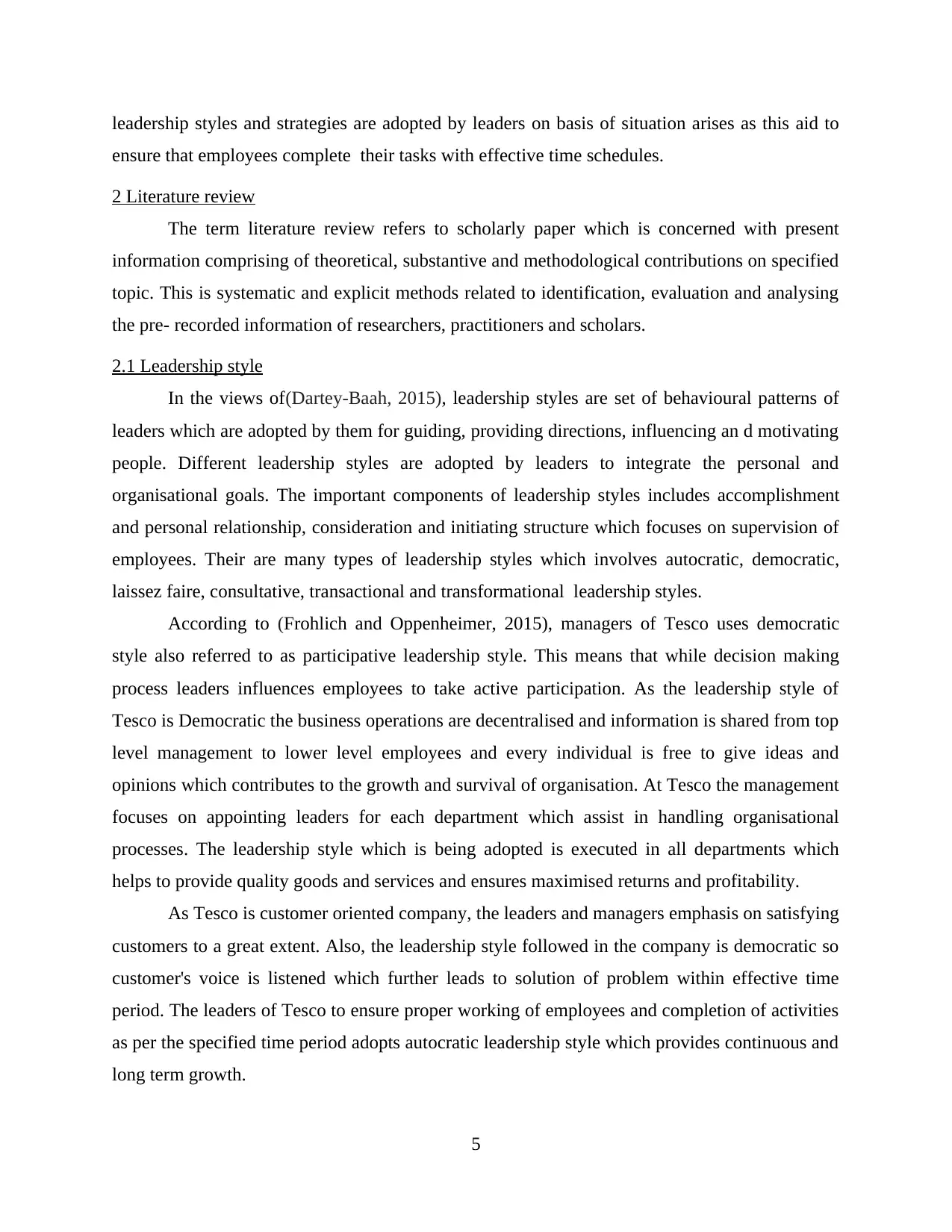
leadership styles and strategies are adopted by leaders on basis of situation arises as this aid to
ensure that employees complete their tasks with effective time schedules.
2 Literature review
The term literature review refers to scholarly paper which is concerned with present
information comprising of theoretical, substantive and methodological contributions on specified
topic. This is systematic and explicit methods related to identification, evaluation and analysing
the pre- recorded information of researchers, practitioners and scholars.
2.1 Leadership style
In the views of(Dartey-Baah, 2015), leadership styles are set of behavioural patterns of
leaders which are adopted by them for guiding, providing directions, influencing an d motivating
people. Different leadership styles are adopted by leaders to integrate the personal and
organisational goals. The important components of leadership styles includes accomplishment
and personal relationship, consideration and initiating structure which focuses on supervision of
employees. Their are many types of leadership styles which involves autocratic, democratic,
laissez faire, consultative, transactional and transformational leadership styles.
According to (Frohlich and Oppenheimer, 2015), managers of Tesco uses democratic
style also referred to as participative leadership style. This means that while decision making
process leaders influences employees to take active participation. As the leadership style of
Tesco is Democratic the business operations are decentralised and information is shared from top
level management to lower level employees and every individual is free to give ideas and
opinions which contributes to the growth and survival of organisation. At Tesco the management
focuses on appointing leaders for each department which assist in handling organisational
processes. The leadership style which is being adopted is executed in all departments which
helps to provide quality goods and services and ensures maximised returns and profitability.
As Tesco is customer oriented company, the leaders and managers emphasis on satisfying
customers to a great extent. Also, the leadership style followed in the company is democratic so
customer's voice is listened which further leads to solution of problem within effective time
period. The leaders of Tesco to ensure proper working of employees and completion of activities
as per the specified time period adopts autocratic leadership style which provides continuous and
long term growth.
5
ensure that employees complete their tasks with effective time schedules.
2 Literature review
The term literature review refers to scholarly paper which is concerned with present
information comprising of theoretical, substantive and methodological contributions on specified
topic. This is systematic and explicit methods related to identification, evaluation and analysing
the pre- recorded information of researchers, practitioners and scholars.
2.1 Leadership style
In the views of(Dartey-Baah, 2015), leadership styles are set of behavioural patterns of
leaders which are adopted by them for guiding, providing directions, influencing an d motivating
people. Different leadership styles are adopted by leaders to integrate the personal and
organisational goals. The important components of leadership styles includes accomplishment
and personal relationship, consideration and initiating structure which focuses on supervision of
employees. Their are many types of leadership styles which involves autocratic, democratic,
laissez faire, consultative, transactional and transformational leadership styles.
According to (Frohlich and Oppenheimer, 2015), managers of Tesco uses democratic
style also referred to as participative leadership style. This means that while decision making
process leaders influences employees to take active participation. As the leadership style of
Tesco is Democratic the business operations are decentralised and information is shared from top
level management to lower level employees and every individual is free to give ideas and
opinions which contributes to the growth and survival of organisation. At Tesco the management
focuses on appointing leaders for each department which assist in handling organisational
processes. The leadership style which is being adopted is executed in all departments which
helps to provide quality goods and services and ensures maximised returns and profitability.
As Tesco is customer oriented company, the leaders and managers emphasis on satisfying
customers to a great extent. Also, the leadership style followed in the company is democratic so
customer's voice is listened which further leads to solution of problem within effective time
period. The leaders of Tesco to ensure proper working of employees and completion of activities
as per the specified time period adopts autocratic leadership style which provides continuous and
long term growth.
5
⊘ This is a preview!⊘
Do you want full access?
Subscribe today to unlock all pages.

Trusted by 1+ million students worldwide
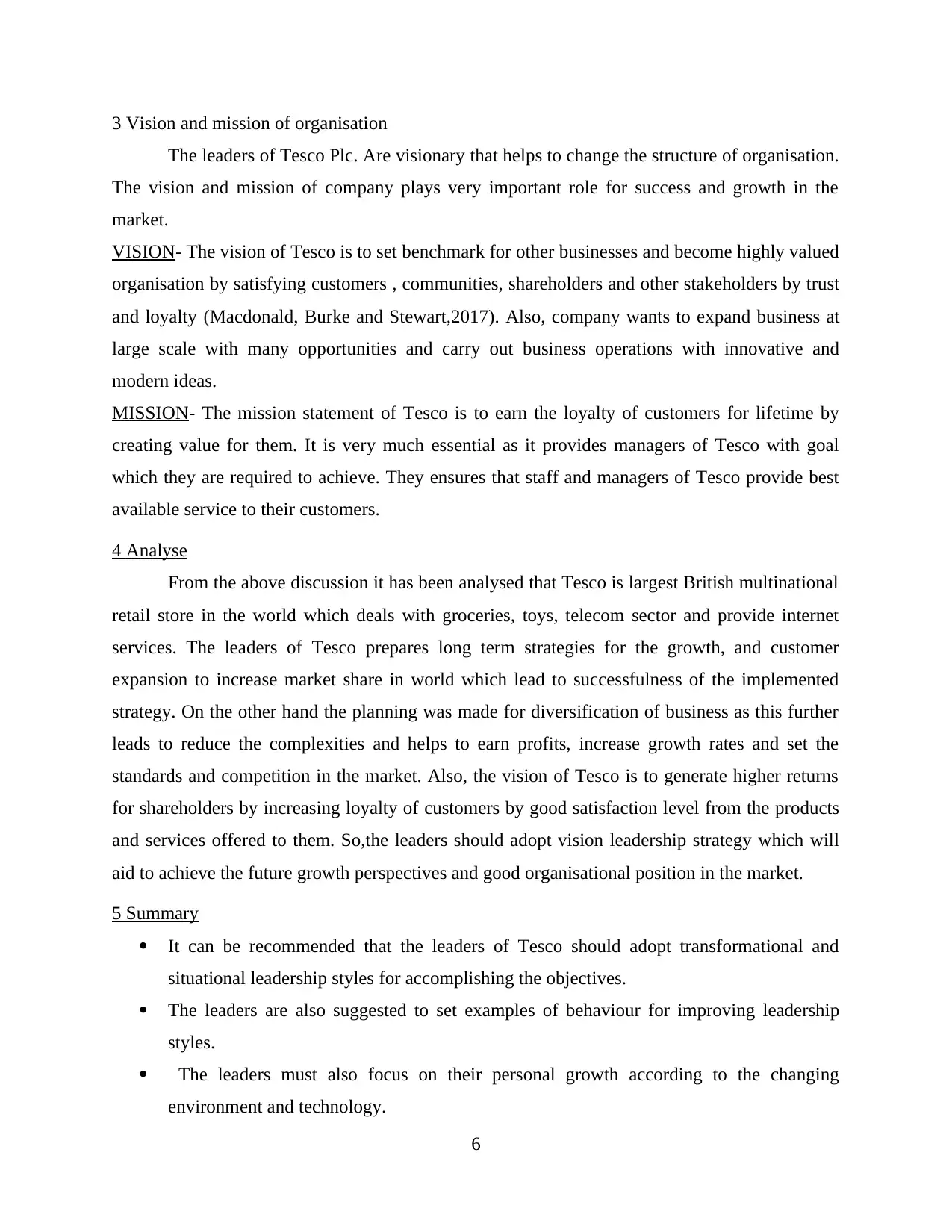
3 Vision and mission of organisation
The leaders of Tesco Plc. Are visionary that helps to change the structure of organisation.
The vision and mission of company plays very important role for success and growth in the
market.
VISION- The vision of Tesco is to set benchmark for other businesses and become highly valued
organisation by satisfying customers , communities, shareholders and other stakeholders by trust
and loyalty (Macdonald, Burke and Stewart,2017). Also, company wants to expand business at
large scale with many opportunities and carry out business operations with innovative and
modern ideas.
MISSION- The mission statement of Tesco is to earn the loyalty of customers for lifetime by
creating value for them. It is very much essential as it provides managers of Tesco with goal
which they are required to achieve. They ensures that staff and managers of Tesco provide best
available service to their customers.
4 Analyse
From the above discussion it has been analysed that Tesco is largest British multinational
retail store in the world which deals with groceries, toys, telecom sector and provide internet
services. The leaders of Tesco prepares long term strategies for the growth, and customer
expansion to increase market share in world which lead to successfulness of the implemented
strategy. On the other hand the planning was made for diversification of business as this further
leads to reduce the complexities and helps to earn profits, increase growth rates and set the
standards and competition in the market. Also, the vision of Tesco is to generate higher returns
for shareholders by increasing loyalty of customers by good satisfaction level from the products
and services offered to them. So,the leaders should adopt vision leadership strategy which will
aid to achieve the future growth perspectives and good organisational position in the market.
5 Summary
It can be recommended that the leaders of Tesco should adopt transformational and
situational leadership styles for accomplishing the objectives.
The leaders are also suggested to set examples of behaviour for improving leadership
styles.
The leaders must also focus on their personal growth according to the changing
environment and technology.
6
The leaders of Tesco Plc. Are visionary that helps to change the structure of organisation.
The vision and mission of company plays very important role for success and growth in the
market.
VISION- The vision of Tesco is to set benchmark for other businesses and become highly valued
organisation by satisfying customers , communities, shareholders and other stakeholders by trust
and loyalty (Macdonald, Burke and Stewart,2017). Also, company wants to expand business at
large scale with many opportunities and carry out business operations with innovative and
modern ideas.
MISSION- The mission statement of Tesco is to earn the loyalty of customers for lifetime by
creating value for them. It is very much essential as it provides managers of Tesco with goal
which they are required to achieve. They ensures that staff and managers of Tesco provide best
available service to their customers.
4 Analyse
From the above discussion it has been analysed that Tesco is largest British multinational
retail store in the world which deals with groceries, toys, telecom sector and provide internet
services. The leaders of Tesco prepares long term strategies for the growth, and customer
expansion to increase market share in world which lead to successfulness of the implemented
strategy. On the other hand the planning was made for diversification of business as this further
leads to reduce the complexities and helps to earn profits, increase growth rates and set the
standards and competition in the market. Also, the vision of Tesco is to generate higher returns
for shareholders by increasing loyalty of customers by good satisfaction level from the products
and services offered to them. So,the leaders should adopt vision leadership strategy which will
aid to achieve the future growth perspectives and good organisational position in the market.
5 Summary
It can be recommended that the leaders of Tesco should adopt transformational and
situational leadership styles for accomplishing the objectives.
The leaders are also suggested to set examples of behaviour for improving leadership
styles.
The leaders must also focus on their personal growth according to the changing
environment and technology.
6
Paraphrase This Document
Need a fresh take? Get an instant paraphrase of this document with our AI Paraphraser
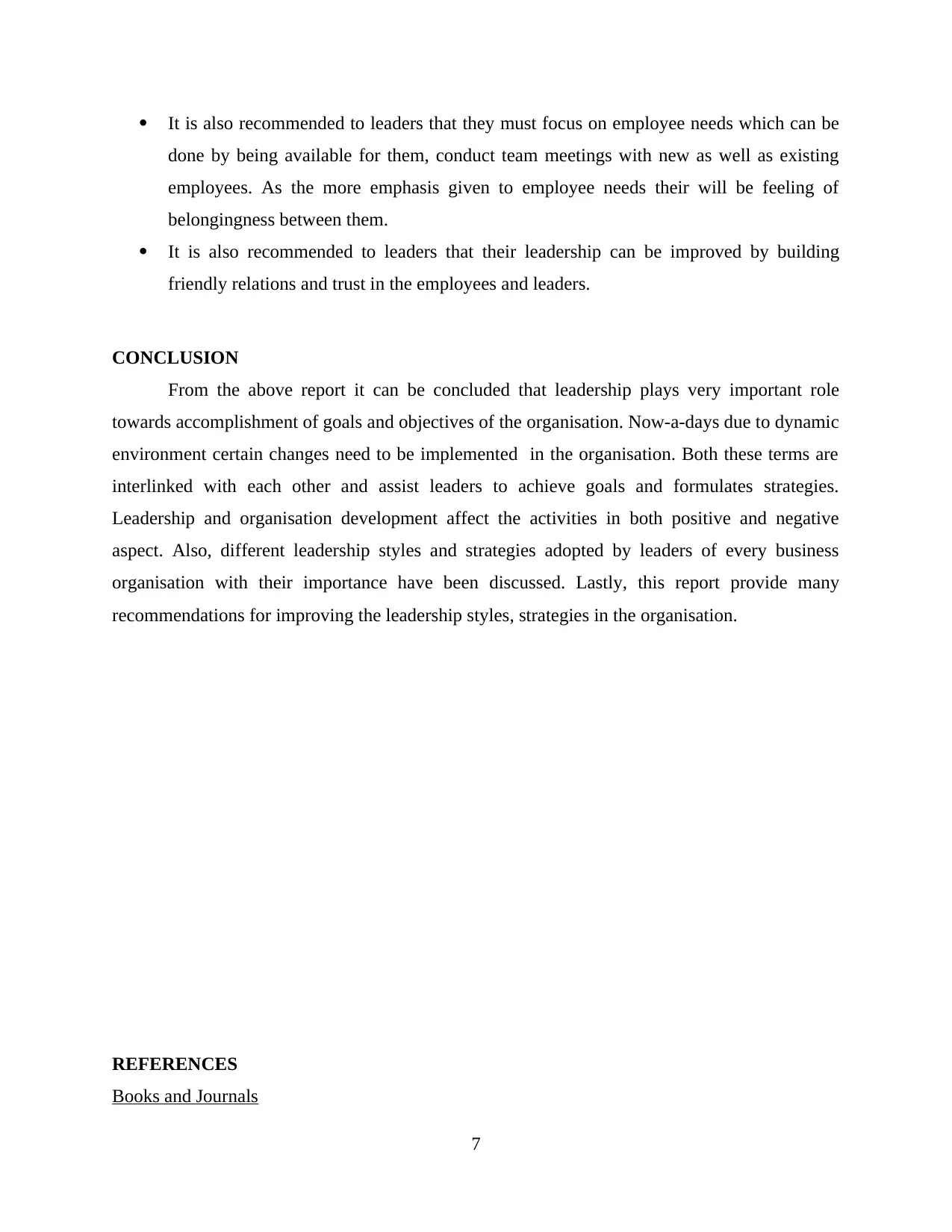
It is also recommended to leaders that they must focus on employee needs which can be
done by being available for them, conduct team meetings with new as well as existing
employees. As the more emphasis given to employee needs their will be feeling of
belongingness between them.
It is also recommended to leaders that their leadership can be improved by building
friendly relations and trust in the employees and leaders.
CONCLUSION
From the above report it can be concluded that leadership plays very important role
towards accomplishment of goals and objectives of the organisation. Now-a-days due to dynamic
environment certain changes need to be implemented in the organisation. Both these terms are
interlinked with each other and assist leaders to achieve goals and formulates strategies.
Leadership and organisation development affect the activities in both positive and negative
aspect. Also, different leadership styles and strategies adopted by leaders of every business
organisation with their importance have been discussed. Lastly, this report provide many
recommendations for improving the leadership styles, strategies in the organisation.
REFERENCES
Books and Journals
7
done by being available for them, conduct team meetings with new as well as existing
employees. As the more emphasis given to employee needs their will be feeling of
belongingness between them.
It is also recommended to leaders that their leadership can be improved by building
friendly relations and trust in the employees and leaders.
CONCLUSION
From the above report it can be concluded that leadership plays very important role
towards accomplishment of goals and objectives of the organisation. Now-a-days due to dynamic
environment certain changes need to be implemented in the organisation. Both these terms are
interlinked with each other and assist leaders to achieve goals and formulates strategies.
Leadership and organisation development affect the activities in both positive and negative
aspect. Also, different leadership styles and strategies adopted by leaders of every business
organisation with their importance have been discussed. Lastly, this report provide many
recommendations for improving the leadership styles, strategies in the organisation.
REFERENCES
Books and Journals
7
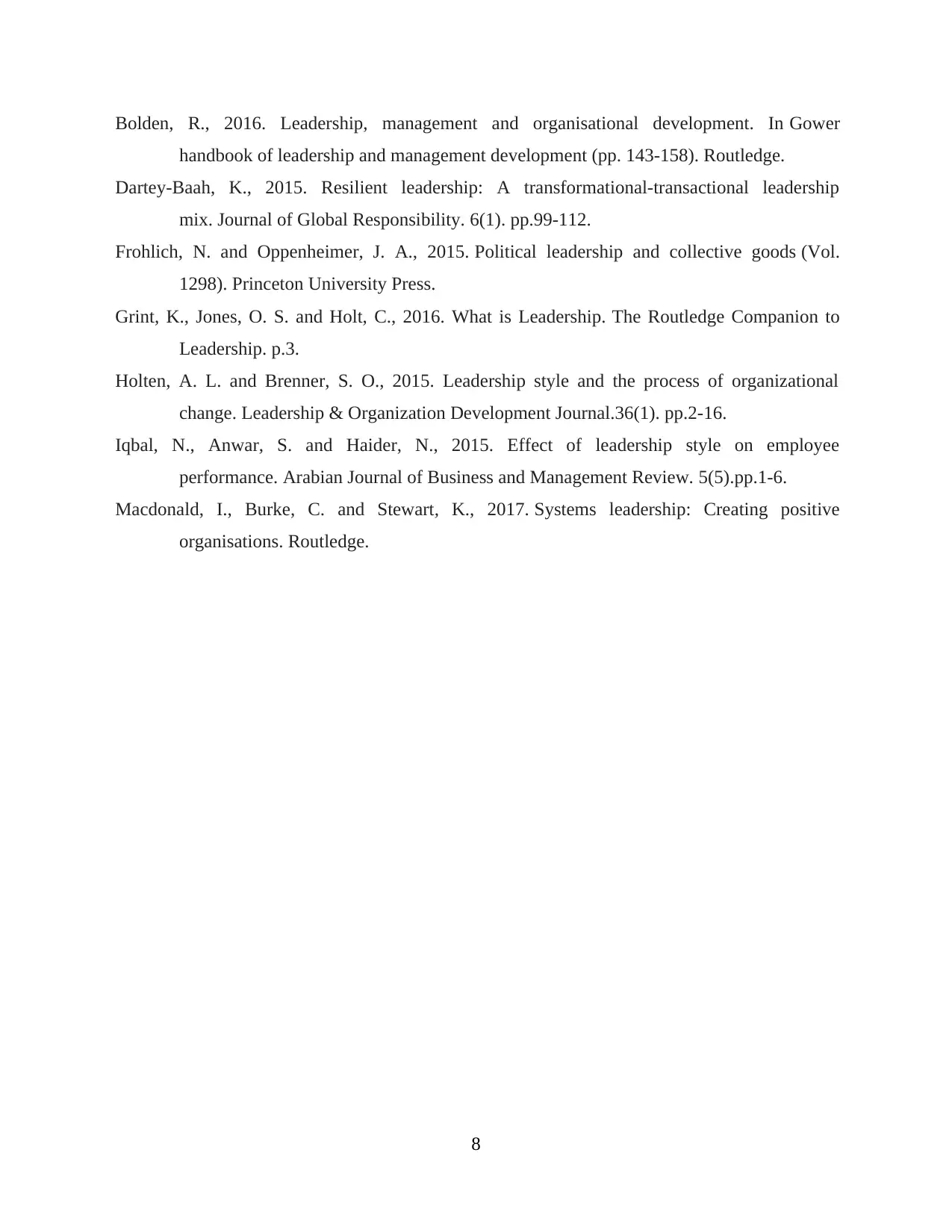
Bolden, R., 2016. Leadership, management and organisational development. In Gower
handbook of leadership and management development (pp. 143-158). Routledge.
Dartey-Baah, K., 2015. Resilient leadership: A transformational-transactional leadership
mix. Journal of Global Responsibility. 6(1). pp.99-112.
Frohlich, N. and Oppenheimer, J. A., 2015. Political leadership and collective goods (Vol.
1298). Princeton University Press.
Grint, K., Jones, O. S. and Holt, C., 2016. What is Leadership. The Routledge Companion to
Leadership. p.3.
Holten, A. L. and Brenner, S. O., 2015. Leadership style and the process of organizational
change. Leadership & Organization Development Journal.36(1). pp.2-16.
Iqbal, N., Anwar, S. and Haider, N., 2015. Effect of leadership style on employee
performance. Arabian Journal of Business and Management Review. 5(5).pp.1-6.
Macdonald, I., Burke, C. and Stewart, K., 2017. Systems leadership: Creating positive
organisations. Routledge.
8
handbook of leadership and management development (pp. 143-158). Routledge.
Dartey-Baah, K., 2015. Resilient leadership: A transformational-transactional leadership
mix. Journal of Global Responsibility. 6(1). pp.99-112.
Frohlich, N. and Oppenheimer, J. A., 2015. Political leadership and collective goods (Vol.
1298). Princeton University Press.
Grint, K., Jones, O. S. and Holt, C., 2016. What is Leadership. The Routledge Companion to
Leadership. p.3.
Holten, A. L. and Brenner, S. O., 2015. Leadership style and the process of organizational
change. Leadership & Organization Development Journal.36(1). pp.2-16.
Iqbal, N., Anwar, S. and Haider, N., 2015. Effect of leadership style on employee
performance. Arabian Journal of Business and Management Review. 5(5).pp.1-6.
Macdonald, I., Burke, C. and Stewart, K., 2017. Systems leadership: Creating positive
organisations. Routledge.
8
⊘ This is a preview!⊘
Do you want full access?
Subscribe today to unlock all pages.

Trusted by 1+ million students worldwide

9
Paraphrase This Document
Need a fresh take? Get an instant paraphrase of this document with our AI Paraphraser

10

11
⊘ This is a preview!⊘
Do you want full access?
Subscribe today to unlock all pages.

Trusted by 1+ million students worldwide
1 out of 12
Related Documents
Your All-in-One AI-Powered Toolkit for Academic Success.
+13062052269
info@desklib.com
Available 24*7 on WhatsApp / Email
![[object Object]](/_next/static/media/star-bottom.7253800d.svg)
Unlock your academic potential
Copyright © 2020–2026 A2Z Services. All Rights Reserved. Developed and managed by ZUCOL.





